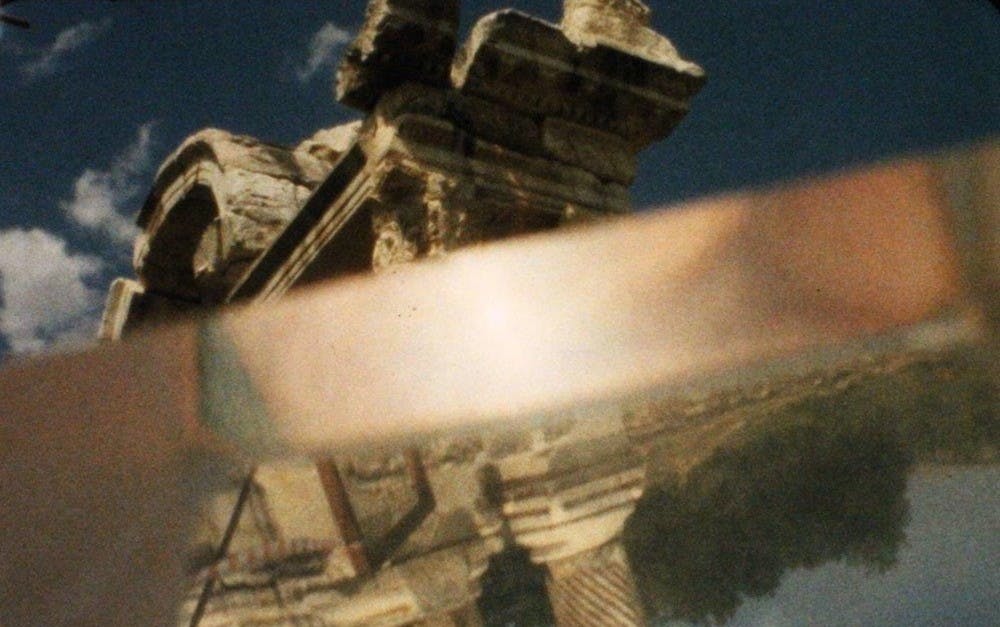When most people think of documentaries, a very clear image comes to mind: talking heads, facts and figures, experts seeking to prove a certain truth. There may be variations of this form, but the word “experimental” usually doesn’t come to mind. However, sometimes the best works of art break the rules.
This fall, Duke will welcome the works of 18 artists who push the boundaries of documentary filmmaking. “The Visible Spectrum,” a free screening series of experimental documentaries will be shown at the Rubenstein Arts Center every Tuesday night at 7 p.m. from Sept. 4 through Oct. 2. This inaugural program as the creation of Shambhavi Kaul, assistant professor of the practice of filmmaking in the Department of Art, Art History & Visual Studies. Kaul wanted to bring together the perspectives of different artists to explore the world of experimental documentaries.
The program was partially born out of Duke’s M.F.A. program in Experimental and Documentary Arts (EDA), which is comprised of a large scope of artists, including filmmakers, photographers and sound artists. Kaul said she was interested in the intersection of experimental and documentary film because of the unique opportunities and conversations they can create.
“Both practices may seem to have limitations, but I think it’s interesting when you bring them together because it opens up opportunities for really generative conversations,” Kaul said.
The nature of experimental film allows for techniques that may not be possible with more mainstream genres of film. Each of the artists use several unique mediums to make their stories come to life, including found footage, digital manipulations and the use of paint and scratched frames. While experimental film may seem abstract and difficult to decipher, Kaul highlighted that all it takes is the courage to tell a story in an unconventional but powerful way.
“The most important part is figuring out the story you want to tell,” Kaul said. “And the experimental part is figuring out the means to get there. It’s a slightly different order of operations but it’s the same concept as other modes of film.”
Kaul plans to bring in guest curators each year that add to the cohesive artistry of the program. This year’s curators are Chi-hui Yang of the Ford Foundation and Jon-Sesrie Goff of the Smithsonian National Museum of African American History and Culture, both of whom have experience both in producing and curating film and photography. Goff received his M.F.A. from Duke in 2016.
Goff’s experience at the Smithsonian helped him discover and protect social movements through preservation and restoration. This perspective along with his participation in the MFA program helped Goff hone his unique perspective on art and film. Goff said he believes that the awareness he carries with him today is partly a result of his time at Duke.
“The MFA program attracts the type of student who draws inspiration from other films,” Jon-Sesrie Goff said. “It gives you the freedom to experiment in a holistic way, to take risks with storytelling, to be able to use data in different ways, to allow it to inform your decision-making practice.”
The screening series seeks to draw an intersection between the nonfiction aspects of documentary film and the more abstract, storytelling capabilities of experimental and narrative filmmaking. The carefully chosen works are meant to come together to humanize facts and figures and, in doing so, elevate social justice movements.
“The works in this program represent the kinds of interventions I think we need in political and social discourse,” Yang said.
The first screening will feature the work of Madeline Anderson, who uses film to tell the story of American race relations from the perspective of black women. While Anderson is not as well known as other filmmakers, Goff believes Anderson deserves to be recognized for her incredible legacy as an artist.
“She was known as a ‘fixer’ who would be called in to help filmmakers gain trust of communities they were working in,” Goff said. “She should sit in the conversational realm as an innovator of documentary.”
The rest of the program holds similar power in both content and artistry. A few of the other artists include Ephraim Asili, who explores the experience of the African diaspora; John Gianvito, who explores the differing perspectives of American history through its monuments and historical markers; and Adam and Zach Khalil, who investigate indigenous experiences through various methods and mediums.
To Kaul, the screenings will help revive the rare but important act of viewing movies at the theater.
“Traditionally, cinema was interesting because it was in the movie theater, and it almost operated as an alternate universe,” Kaul said. “It transforms your understanding of the world you live in.”
She argues that while streaming media online has its place, it is a different experience to view media in a theater.
“There’s of course the aesthetic effect of watching the big screen but to me it’s the sociality of it,” she said. “People getting together and doing something together. I think it’s really valuable for students to share in this space and be able to talk about the ideas instead of each student just watching it on their own computers.”
According to Kaul, the screenings will showcase a bravery in filmmaking made possible through experimental filmmaking.
“We need spaces to improvise and feel comfortable failing, especially today when everyone is constantly watching each other through social media,” she said. “I want the program to create conversation and ask tough questions to bring unlikely people together.”
The full schedule for the fall series can be found at https://ami.duke.edu/fall-2018-series.
Get The Chronicle straight to your inbox
Signup for our weekly newsletter. Cancel at any time.

